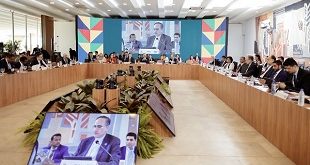
By Julia Spiegel & Noel Atama
In the months since the armies of Uganda, the Democratic Republic of Congo, and South Sudan launched Operation Lightning Thunder, a joint military offensive against the Lord’s Resistance Army, or LRA, the threat to civilians in the region has dramatically intensified. Efforts to negotiate a political solution with the LRA ran aground in late 2008, and prospects for a peaceful end to the conflict are nonexistent as long as LRA leader Joseph Kony refuses to sign the deal that remains on the table. Unless Kony and the LRA’s other top commanders are apprehended or otherwise removed, the group’s campaign of terror will continue.
Cooperation between Uganda, Congo, and South Sudan in addressing the LRA as a shared regional threat is a major breakthrough, and should be welcomed by the international community. However, due primarily to domestic political pressures and concerns about the lengthy presence of a foreign military on his soil, Congolese President Joseph Kabila recently requested the withdrawal of the Ugandan army from northeastern Congo-the primary locus of the LRA’s current predations and regional efforts to end them. Many Ugandan troops, however, have stayed in Congo and continue to conduct ‘intelligence operations’ against the LRA. Some low-scale fighting between the remaining Ugandan troops and the LRA has been reported, but these largely below-the-radar efforts are likely insufficient to corner the LRA leadership. Moreover, the Ugandan military, the Congolese army, and the U.N.peacekeeping mission in Congo, or MONUC, have not demonstrated the capacity to effectively protect civilians or pursue the LRA in these remote forests.
Genuine military pressure on the LRA will require the involvement of external actors. Given the United States’ support for the poorly executed ‘Lightning Thunder’ and that U.S. leadership and investment is critical to planning and executing an operation with a greater chance of success, the Obama administration now has a responsibility and opportunity to help finish the job.

This will not be easy. While the LRA is on the run, it is dispersed in small groups over a vast expanse of challenging, intermittently populated terrain.
Although scattered, the LRA continues to conduct highly coordinated and ruthless attacks against civilians. Since mid-December 2008, the LRA has brutally murdered more than 1,000 people in northeastern Congo and southern Sudan and abducted nearly 250 children. In at least one case in northeastern Congo’s Orientale province an entire village was pillaged and burned to the ground. More than 180,000 Congolese have been forced from their homes, while in southern Sudan, a further 60,000 have been displaced. Because of poor planning, insufficient logistical support, and far too few U.N. peacekeepers and Congolese soldiers (those forces tasked with civilian protection in ‘Lightning Thunder’), local communities and the masses of internally displaced people are highly vulnerable. Humanitarian access in these remote areas is limited; the displaced are living hand to mouth in and around towns and villages, and scarce supplies of food and medicine are quickly being exhausted.
Absent any genuine opportunity for a political settlement, the international community has few attractive options to end this conflict, yet the need for action is urgent. Doing nothing will result in more death and destruction, and the LRA is already using the current space to reorganise and rebuild its military strength. The longer the international community waits, the more time the LRA will have to regroup and further wreak havoc- erasing the relative gains made by the three-month operation. The Congolese army is incapable of either protecting civilians or defeating the LRA, and Congolese forces themselves are regularly responsible for appalling human rights abuses, although they have been somewhat more disciplined in the northeast to date. MONUC is stretched near to its breaking point and principally preoccupied with the fragile situation in North and South Kivu provinces.
The United Nations is unlikely to contribute much more than limited tactical support to Congolese forces operating in the area.
Launching a new military operation without closely examining what went wrong with the ‘Lightning Thunder’ and applying lessons learned will only result in greater civilian casualties and displacement while squandering valuable resources and political will. However, a revitalised and revamped military operation focused on apprehending the senior LRA leadership while simultaneously protecting civilians is the best way to defeat the insurgency and allow displaced civilians to return to their homes. The most likely practical option for success is more robust Western support for a second Ugandan-led operation. Shifting political winds in Kinshasa in recent weeks have opened the door for the Ugandan army to return in full force and with proper consultation and planning by the Congolese government. For a second Ugandan-led military operation to have a chance at success, however, it must have strong support from the United States and the international community, and the full commitment from the Congolese government and army to complete the job in a reasonable timeframe and operate in all LRA-affected areas of Congo-including Faradje.
Uganda also must provide credible assurances that Congolese fears about ulterior Ugandan motives (such as illegal extraction of Congolese resources) will not become reality. Regional armies and MONUC must make civilian protection an indisputable priority- from careful planning to acquiring necessary resources to executing regular patrols. The Congolese army should deploy proactively with MONUC support in civilian areas that have so far evaded attacks by the LRA, and the Congolese army and MONUC must also deploy to the main civilian centres to protect civilians and the large groupings of displaced people around these towns while the Ugandan army carries out operations to track and fight the LRA.
If the United States takes the lead in supporting a new Ugandan military operation, as Enough believes it should, it must provide solid planning, intelligence, coordination, and logistical support-and take greater responsibility for the execution and outcomes of the operation.
julia.spiegel@gmail.com
This excerpt is the introduction of Enough’s latest report on the LRA. To read the full report, go to: www.enoughproject.org/publications/finishing-fight-against-lra-strategy-paper
 The Independent Uganda: You get the Truth we Pay the Price
The Independent Uganda: You get the Truth we Pay the Price



